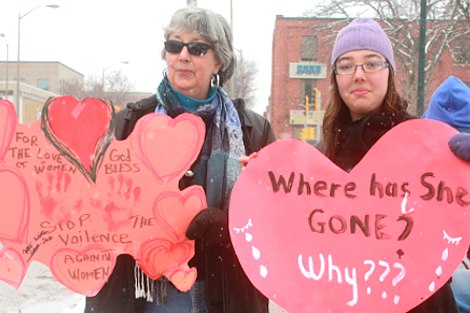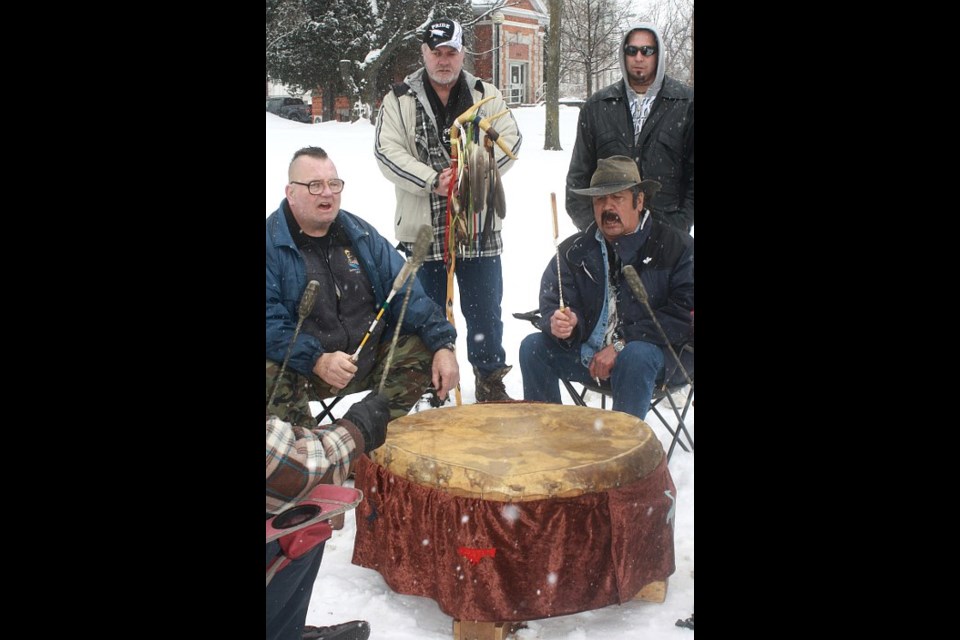
That's too many more than it was last year at this time.
Even one more is too many more, says Baranski.
What's worse, she adds, no one is looking for them.
"We live in Canada, why are there more than 500 missing or murdered women?" said Mary Ellen Gillies (seen on the left with her daughter Jennie Gillies) at the Memorial March for Missing and Murdered Women, led by Womyn for Social Justice for the fifth consecutive year.
"I have a daughter," said Ellis. "It's very scary for all women to think that these women are missing and no one is looking for them."
She said she feels it's important to raise awareness of this issue so more people will add their voices to the call for justice.
"There's strength in numbers," said Jennie Gillies, who also added that she was encouraged by the high number of young people at the march, young people who apparently cared passionately about this issue and about the missing or murdered women.
This year's memorial march in front of the Sault Ste. Marie Courthouse also saw the highest turn out for the event with about 150 people coming out to show their support for the missing and murdered women.
Baranski credits the high turn out to social networking and to committed volunteers.
"We Facebooked it like crazy and we used Twitter," said Baranski. "We used social networking and it paid off."
In December, 2011, The United Nations Committee on the Elimination of Discrimination Against Women (CEDAW) began an inquiry into the murders and disappearances of First Nations women in Canada.
The inquiry was launched in response to a call by the Native Women’s Association of Canada and the Canadian Feminist Alliance for International Action.
The two groups claim that Canadian governments have failed to take effective action in connection with the murders and disappearances of First Nation women, said a news release from Nishnawbe Aski Nation (NAN).
“The way which all levels of government, including the policing and the justice system, have treated our sisters is horrendous. If these crimes occurred in a middle class suburban neighbourhood, you can be rest assured that an inquest would have been completed years ago," said NAN Deputy Grand Chief Mike Metatawabin in the release. "It shows the true perspective that Canada has on its original inhabitants.”
Batchewana First Nation Chief Dean Sayers was one of the guest speakers at the Sault Ste. Marie memorial march on Valentine's Day and he brought a message of empowerment.
"We can't continually look to the justice system for the answers and for the resolutions," he said. "We need to take ownership and I call on the grandmothers to take a larger role."
"If all the grandmothers took back their voices there wouldn't be 600 missing women today," Sayers said. "I call on all the grandmothers to truly take on that leadership role in the families and in the country to help us get to the bottom of this."
Sayers also called on those instruments of the Canadian government, such as the Attorney General's Office, to look into this properly, to find the missing women and to make sure that no others go missing or are murdered.
Baranski said that Womyn for Social Justice and Chief Dean Sayers were of one mind on this issue.
"We do not want to keep having these," she said. "We want the numbers to go right down to zero missing women."
Baranski said two major factors that contribute to the number of missing or murdered First Nation women in Canada are poverty combined with systemic racism and marginalization of these women.
"If a white middle-class woman goes missing, look at the amount of resources that go into finding her," she said. "There are 572 missing Aboriginal women, poor women, marginalized women and no one is looking for them."
Baranski said she believes many people in Canada don't know about this issue and that's why awareness raising events like the Memorial March for Missing and Murdered Women is so important.
Womyn for Social Justice will be hosting a free film festival on March 8, International Women's Day.
The Womyn Tribe Film Festival presents films chosen to stimulate awareness of, thought about, discussion of and action on issues that affect the health and well-being of women around the world.
